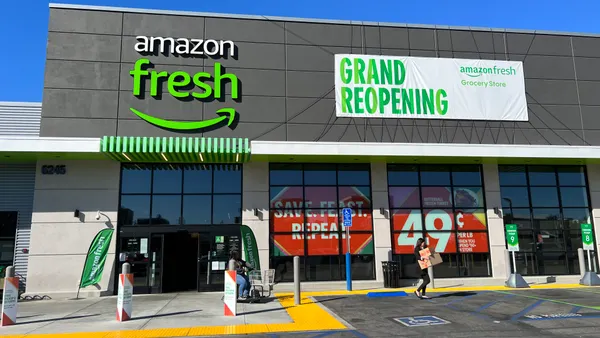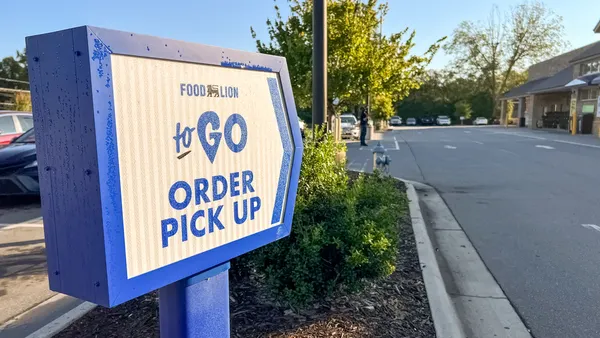Dive Brief:
- A majority of global online grocery sales will come from omnichannel retail formats by 2024, according to a new analysis from Edge by Ascential. Target, Walmart and Kroger will be the primary drivers of omnichannel sales, the report said, with the ability to leverage their physical stores and click-and-collect offerings.
- For the next five years, online edible grocery sales will experience a compound annual growth rate of 13%, reaching $162 billion in total sales by the end of the period. Just 3% of edible grocery sales currently occur online.
- The report predicts that Amazon and Walmart will continue to lead food e-commerce sales, with Amazon reaching $15 billion in online food sales by 2024 and Walmart reaching $14 billion.
Dive Insight:
Edge by Ascential reports an acceleration in grocery technology both in the U.S. and abroad. Grocery companies' investments in technology to speed up fulfillment and provide a more frictionless shopping experience will pave the way forward and give shoppers more effective tools to buy online. The barriers that have prevented more rapid growth in omnichannel grocery sales are "coming down," according to Violetta Volovich, author of the report and an associate analyst at Edge by Ascential.
Grocers are launching new technology at a faster rate than ever before. Kroger has now announced its fifth Ocado warehouse to boost its e-commerce business nationwide, and Walmart is leading the charge in grocery pickup. Amazon is reviving AmazonFresh and growing its grocery customer base through Whole Foods. Independent and regional grocers are also kicking technology into high gear to drive online sales. Raley's is using artificial intelligence to optimize its pricing strategy, and SpartanNash has launched a geofencing system.
Globally, the Asia-Pacific region is driving food e-commerce growth, accounting for nearly 52% of global edible grocery sales in 2019. In Japan, Walmart's Japanese banner, Seiyu, is testing delivery by drone to speed up delivery fulfillment. Alibaba's Hema in China uses big data to appropriately stock its stores, which also act as fulfillment centers.
The report finds an abundance of global innovation outside of Asia, too. German supermarket chain Edeka has invested in Picnic, a Dutch app that is rapidly increasing its online grocery assortment, and in Australia, Woolworths has partnered with Spoon Guru to add dietary filters to its e-commerce site. Tesco is reportedly exploring technology for an automated store through Trigo Vision.
For grocers, cost and uncertainty over consumer adoption are key concerns when it comes to investing in e-commerce. Customers, in turn, like to see and feel the food they buy and haven't had access to seamless technology with e-commerce in its early years.













